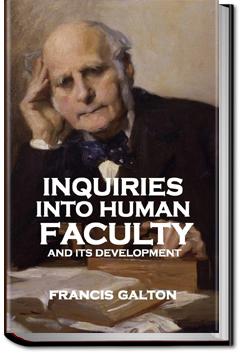UNLIMITED Audiobooks and eBooks
Over 40,000 books & works on all major devices
Get ALL YOU CAN for FREE for 30 days!
Inquiries into Human Faculty and Its Development
Francis Galton
Book Overview:
Francis Galton, credited with the discovery of identification by fingerprinting, also took a long term interest in the study of biometrics. In this book, many different faculties, both observable and measurable are discussed in length and methods of collecting data suggested. In addition, casual observations from personal memoirs, and drawing similar cases from other reputable sources are also compared. A wide variety of topics are mentioned, including differences in appearance within family members, to subtle habits and emotional responses comparing humans and animals are mentioned in a series of chapter length essays.
Francis Galton, credited with the discovery of identification by fingerprinting, also took a long term interest in the study of biometrics. In this book, many different faculties, both observable and measurable are discussed in length and methods of collecting data suggested. In addition, casual observations from personal memoirs, and drawing similar cases from other reputable sources are also compared. A wide variety of topics are mentioned, including differences in appearance within family members, to subtle habits and emotional responses comparing humans and animals are mentioned in a series of chapter length essays.
How does All You Can Books work?
All You Can Books gives you UNLIMITED access to over 40,000 Audiobooks, eBooks, and Foreign Language courses. Download as many audiobooks, ebooks, language audio courses, and language e-workbooks as you want during the FREE trial and it's all yours to keep even if you cancel during the FREE trial. The service works on any major device including computers, smartphones, music players, e-readers, and tablets. You can try the service for FREE for 30 days then it's just $19.99 per month after that. So for the price everyone else charges for just 1 book, we offer you UNLIMITED audio books, e-books and language courses to download and enjoy as you please. No restrictions.
The investigation of human eugenics--that is, of the conditions under which men of a high type are produced--is at present extremely hampered by the want of full family histories, both medical and general, extending over three or four generations. There is no such difficulty in investigating animal eugenics, because the generations of horses, cattle, dogs, etc., are brief, and the breeder of any such stock lives long enough to acquire a large amount of experience from his own personal observation. A man, however, can rarely be familiar with more than two or three generations of his contemporaries before age has begun to check his powers; his working experience must therefore be chiefly based upon records. Believing, as I do, that human eugenics will become recognised before long as a study of the highest practical importance, it seems to me that no time ought to be lost i. . . Read More
Try now for FREE!

"Love your service - thanks so much for what you do!"
- Customer Cathryn Mazer
"I did not realize that you would have so many audio books I would enjoy"
- Customer Sharon Morrison
"For all my fellow Audio Book & E-Book regulars:
This is about as close to nirvana as I have found!"
- Twitter post from @bobbyekat


